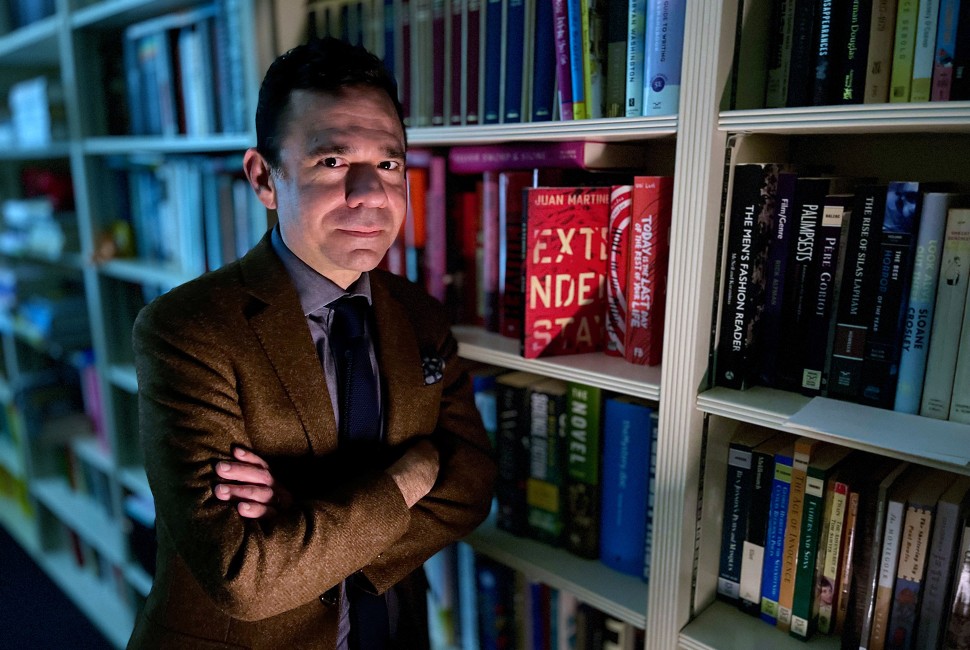Years after leaving Las Vegas in 2011, creative writing professor Juan Martinez couldn’t shake off disturbing visions of that city.
Originally from Bucaramanga, Colombia, Martinez spent six years in Las Vegas completing his Ph.D. in English and working odd jobs. For one job, he interviewed workers who did back-of-the-line work in diners and cafes to learn how they interacted with health manuals and video training. One of weirder assignments was when a Las Vegas weekly paid him to write about the experience of walking from one end of Las Vegas to the other, a journey which took him from Fremont, the “dark heart” of the city, to the outer fringes.
During that walk, Martinez saw veterans with open leg wounds panhandling next to women in showgirl outfits doing their best to draw pedestrians into casinos. He saw nearly abandoned hotels sitting adjacent to luxury resorts. He was simultaneously drawn and repelled.
Martinez did not set out to write horror stories. But when invited to contribute a story to a horror anthology on the theme of Las Vegas, he was grateful for the opportunity to give shape to the haunting impressions that would not leave him and surprised by how quickly the short story flowed out of him.
Martinez stuck with the horror genre for his full-length novel “Extended Stay” (University of Arizona Press, 2023), which is set in a rundown neighborhood of Las Vegas. It is a contemporary twist on the classic haunted house story that incorporates topics of migration and the workforce. Colombian siblings Alvaro and Carmen have fled to the U.S. after the remainder of their family is brutally murdered at a roadblock by a terrorist group. Alvaro finds work at the beckoning Hotel Alicia as a line cook. There, he and his sister stay rent-free alongside fellow laboring migrants. The hotel seems to feed off the secrets of its vulnerable guests, each with something to hide. Alvaro, who has tried to outrun his traumatic memories, may need to face them head-on if the siblings are to survive.
As Hispanic Heritage Month ebbs, and the Halloween horror season crests, Martinez spoke with Northwestern Now about his latest novel and the “language of horror.”
Why is horror a good genre for exploring the undocumented Latinx experience?
The language of horror is a great vehicle to talk about trauma, violence, displacement, all of that. But some of that trauma is also deeply personal. I was not undocumented, but me and my family experienced a roadblock similar to the one that opens the novel. It could have gone horribly, but it didn’t. The language of horror allows you to navigate that trauma in ways that are bounded and safe — to go deeper into awful possibilities, like the potential repercussions of horrific encounters. To see what happens when you follow a story through.
How does your experience in Las Vegas play into that?
Horror is the idea of staring unpleasant things in the face. And Vegas, in and of itself, is a place where you have to reckon with a bunch of things you don’t want to reckon with. One of my professors said it was one of the last places where you could build a middle-class life out of a blue-collar job. But a lot of those jobs swirled around the exploitation of others, even if you were not directly involved. There’s just so much genuine opportunity in Las Vegas, so many ways for someone to rebuild a life if they want to, but you’re doing so amid a lot of wreckage, and all of it swirling around money. Like everywhere else, sure. But Vegas is so upfront about it, and so insistent on money as a driving force no matter the consequences.
What is it about the experience of a good horror story that draws us in?
Horror gives us the opportunity to navigate the more frightening corners of our lived experience and our messy interior lives. I think that’s part of it — the opportunity and the thrill to go to these dark places, but also the reassurance that we can come back, and the hope that we’ll be okay, maybe. We’ll make it out. I mean, some of us will make out. The genre is really good at showing people trying to help each other in really bad situations. It’s a weird paradox, but a good one. Horror is where you see people at their best because everything around them is falling apart.
The novel also works as a parable about how humans treat other humans. What makes horror an effective form for looking at social truths?
The wonderful thing about horror is that as long as you meet the expectations, you can smuggle whatever thing you want in there. The genre is sturdy because it’s so slippery.
As long as you deliver on the blood and the gore, people are willing to consider what the real consequences are of pain and suffering in the world, both existential and cultural. That’s what horror does, at its best — it tells us deeply satisfying, intensely fun stories about the least satisfying, least fun aspects of our world.
Can you share an example?
“Night of the Living Dead” is a great example. That film could not have happened without the people who made it coming out of the Vietnam War. It was one of the first horror movies to look at what it means — what it actually means — to do damage to a body. That connection is explicit. Tom Savini did the makeup effects for that movie, and that was right after his experience as a combat photographer. He insisted on actual guts on screen, which they bought on the cheap from a butcher.
But there is also a Black man at the heart of the story who lives through the worst of the zombie onslaught, who survives through skill and ingenuity. He dies at the end, but it’s not zombies who do him in, it’s the police.


